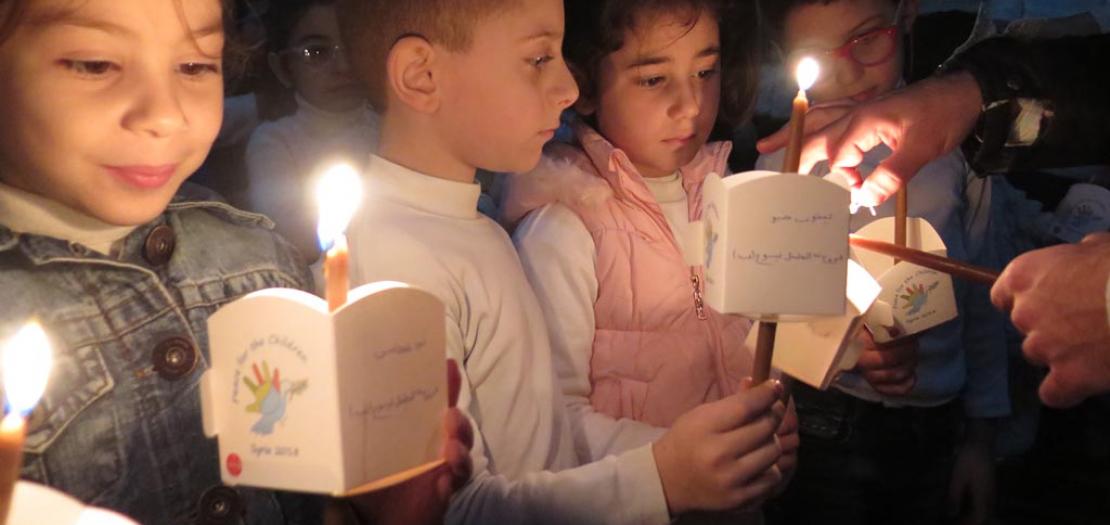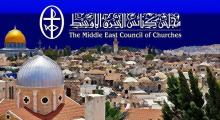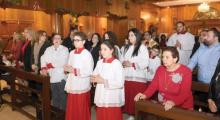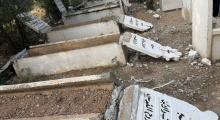Issued by the Catholic Center for Studies and Media - Jordan. Editor-in-chief Fr. Rif'at Bader - موقع أبونا abouna.org

Charity is the only adequate response to the "physical, economic and social wounds" that the Syrian people are suffering in the nearly 10 years of war, sanctions and the coronavirus pandemic. According to Cardinal Mario Zenari, the Apostolic Nuncio to Syria, Catholic institutions have a crucial role to play in rebuilding the “climate of trust” in the strife-torn country that seems “to have lost hope”.
Poverty, war, pandemic
According to the United Nations, 83 per cent of the population in Syria lives below the poverty line. Speaking to AsiaNews, the cardinal explained that a feeling of hopelessness is particularly affecting the young people, who in this deadlock situation find no reason in continuing to stay in the strife-torn country.
Even if the pandemic has had a limited effect in the country, it has exacerbated the "physical suffering" of the people. However, Cardinal Zenari pointed out, dealing with the virus is difficult with hospitals in appalling conditions and working only partly.
Apart from those wounded and mutilated by war, Syria has a total of over 12,000 coronavirus infections and over 760 deaths. According to the Holy See diplomat, the death toll could be higher due to the under-reporting from war-torn areas such as Idlib in the northwest.
The Syrian conflict
Even before the Syrian conflict began, many people were suffering because of high unemployment, corruption and a lack of political freedom under President Bashar al-Assad, who succeeded his father, Hafez, after he died in 2000. In March 2011, pro-democracy demonstrations erupted in the southern city of Deraa, inspired by the "Arab Spring" in neighbouring countries. When the government used deadly force to crush the dissent, protests demanding the president's resignation erupted nationwide, developing into a civil war. Islamists and terror groups joined the fray to make use of chaos to establish an "Islamic State" spanning Syria and Iraq.
Church initiative
Nearly 10 years of bombing and armed clashes, coupled with jihadist violence, have caused a collapse of the health system, with an extreme shortage of facilities, drugs, oxygen cylinders, and personal protective equipment. For 3 years the Syrian Church, in collaboration with the Holy See and the personal support of Pope Francis, has been engaged in the “Open Hospital” initiative with 2 centres in Damascus and 1 in Aleppo.
Cardinal Zenari said that they have treated over 40 thousand poor Christians and Muslims in these centres, even though in recent times people were afraid to come and get treatment for fear of the virus. “This initiative testifies not in words, but in deeds, how powerful the weapon of charity is,” the cardinal stressed.
Repairing the social fabric
Besides physical injuries, the cardinal pointed out, there is also the damage caused to the rich social fabric marked by peaceful coexistence that Syria was once known for. Repairing this damage, he said, will be “one of the tasks entrusted to religions". Despite good relations among religions, he noted, this task is enormous. Hence they need to work along lines of the “Document on Human Fraternity”, signed by Pope Francis and the Grand Imam of Al Azhar last year. They need to accelerate on “coexistence and restoring the fabric as a point of reference”.
Healing “economic” wounds
Cardinal Zenari also spoke about the recovery of Syria from the “economic” wounds, which is no longer talked about. These wounds caused by sanctions have stopped the recovery process, which can also be attributed to other factors, such as the crisis in neighbouring Lebanon. Besides, nations that had helped Syria so far, are now involved in their own war against the Covid-19 pandemic.
In this critical context, the Vatican diplomat pointed out, the work of Catholic agencies is fundamental because "it is capable of going beyond ethnic and religious affiliation”. “A charity open to all, Muslims and Christians, which aims at the reconstruction of homes,” he said, “makes up for food emergencies and wants to guarantee the right to study in schools.”
The Good Samaritan
Cardinal Zenari said that all of us can be the Good Samaritan and help a people exhausted by war and Covid-19. Evoking the parable, he said, “Syria has run into too many thieves in recent years, who have beaten it and abandoned it on the roadside, disappeared from the radar of the media and from the attention of the international community.” “Each aid is a very precious drop, although Syria needs real water pipelines, rivers of aid [from the international community and world powers] to be able to recover from a critical humanitarian situation.”
Pope’s upcoming visit to the Middle East
He recalled the Urbi et Orbi Christmas message of Pope Francis, in which he drew attention to the suffering of children in the areas of war from Iraq to Syria and Yemen. In this context, he said, the Pope’s apostolic visit to Iraq in March is even more important. It is “good news for Christians throughout the Middle East who no longer feel like beggars, but understand that they are in the heart of the Pope,” the cardinal added.







